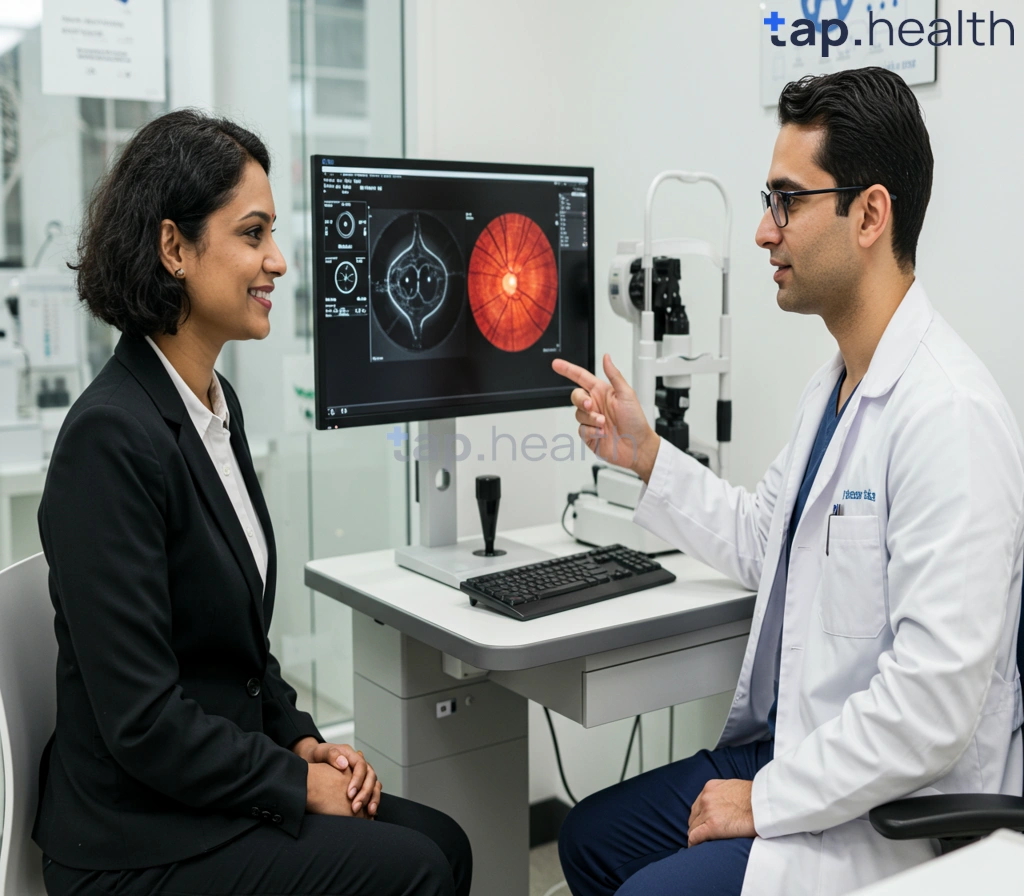Table of Contents
- Top Doctors for Diabetic Retinopathy Treatment
- Finding the Best Eye Specialist for Diabetic Retinopathy
- Diabetic Retinopathy: Which Eye Doctor Should You Choose?
- Guide to Finding the Right Ophthalmologist for Diabetic Retinopathy
- Hospitals & Clinics Specializing in Diabetic Retinopathy Care
- Frequently Asked Questions
- References
Living with diabetes means taking proactive steps to protect your health, and that includes your vision. Diabetic Retinopathy: Finding the Right Doctors and Departments is a crucial aspect of managing this condition, and navigating the healthcare system to find the best specialists can feel overwhelming. This blog post is designed to guide you through that process, providing practical tips and information to help you find the ophthalmologists and specialized departments best equipped to diagnose and treat your specific needs. We’ll explore the types of specialists to consider and what questions to ask, empowering you to take control of your eye health. Let’s get started!
Top Doctors for Diabetic Retinopathy Treatment
Finding the right ophthalmologist for diabetic retinopathy is crucial, especially in Indian and tropical countries where the prevalence of diabetes is high. Early detection and treatment are vital to prevent vision loss. Diabetic retinopathy, a complication of diabetes, affects blood vessels in the retina, and in many cases is asymptomatic in early stages, highlighting the need for regular eye exams. This is further complicated by the fact that diabetic neuropathy, affecting 30-50% of diabetic patients, can cause pain and reduced mobility, making regular appointments more challenging.
Finding Specialized Care
Look for ophthalmologists specializing in diabetic retinopathy and retinal diseases. Many large hospitals in major Indian cities and across tropical countries have dedicated retina clinics or departments. Seek out board-certified ophthalmologists with experience managing diabetic eye disease. Inquire about their experience with advanced treatments like laser photocoagulation or anti-VEGF injections, depending on the stage of your retinopathy.
Accessing Quality Care
Consider factors like location, accessibility, and insurance coverage when choosing a doctor. Many hospitals and clinics offer financial assistance programs, especially in the public sector. Online searches can help you identify specialists and read patient reviews. Remember, proactive management is key to preserving your vision. Don’t delay seeking care if you have diabetes. Regular eye check-ups are essential for early detection and timely intervention. To understand how frequently you should have your eyes checked, read our article on How Often is Diabetic Eye Screening?. Contact your physician or search online for specialists in your area to schedule an appointment today. For more tips on protecting your vision, see our guide on How to Protect Your Vision with Diabetes: Essential Eye Care Tips.
Finding the Best Eye Specialist for Diabetic Retinopathy
Diabetic retinopathy is a serious complication of diabetes, affecting millions worldwide, particularly in regions like India and other tropical countries. Early detection and treatment are crucial to prevent vision loss. Given the significant health risk, finding the right eye specialist is paramount. Choosing the wrong doctor can delay diagnosis and increase the risk of severe complications.
Identifying the Right Specialist
Look for ophthalmologists specializing in diabetic retinopathy and retinal diseases. Many large hospitals and eye clinics in India and tropical nations have dedicated departments for this. Experience with diabetic patients is crucial, especially since nearly 15% of diabetics experience foot ulcers in their lifetime, highlighting the interconnectedness of overall diabetic care. A specialist familiar with managing this complication will provide more holistic care. For more information on managing diabetes comprehensively, you might find Which Diabetes Drug is Best for Diabetics with Kidney Disease? helpful, as kidney health is closely tied to diabetic retinopathy.
Where to Find Them
Start by searching for “diabetic retinopathy specialists near me” along with your city and region. Check hospital websites, online doctor directories, and seek recommendations from your primary care physician or trusted sources within your community. Reading reviews and testimonials can provide valuable insights into the expertise and patient experience of different specialists. Inquire about their experience with the latest diagnostic technologies and treatment options, including laser therapy and anti-VEGF injections. Remember that managing your overall diabetes is critical; consider reading more about Safe and Effective Dietary Supplements for Diabetes Care to support your eye health.
Taking Action
Don’t delay your eye exam. Regular screenings are essential, especially if you have diabetes. Finding a qualified ophthalmologist specializing in diabetic retinopathy in your region is the first step towards protecting your vision and overall health. Schedule an appointment today and take control of your eye health.
Diabetic Retinopathy: Which Eye Doctor Should You Choose?
Diabetes significantly increases your risk of developing eye complications, including diabetic retinopathy. Early detection and treatment are crucial to prevent vision loss. Given the prevalence of diabetes in India and other tropical countries, choosing the right ophthalmologist is paramount. Nearly 30% of individuals with diabetes develop diabetic nephropathy, highlighting the interconnectedness of these conditions and the importance of comprehensive care. Managing diabetes effectively is also crucial, and you might find information on medication interactions helpful, such as in our article on `Can Diabetics Take Antibiotics?`.
Finding the Right Specialist
In India and other tropical regions, you’ll find various eye care professionals. Choosing the right one depends on the severity of your condition. For routine eye exams and initial screenings for diabetic retinopathy, an optometrist might suffice. However, for diagnosis and management of established diabetic retinopathy, you need a retinal specialist, also known as a vitreoretinal surgeon or ophthalmologist specializing in the retina. These specialists possess advanced expertise in diagnosing and treating complex retinal conditions like diabetic retinopathy, macular edema, and proliferative retinopathy.
Where to Find Specialized Care
Look for ophthalmologists affiliated with reputable hospitals or eye clinics in your area. Many large hospitals in major Indian cities and other tropical regions have dedicated departments of ophthalmology with experienced retinal specialists. Online searches can assist, filtering for “diabetic retinopathy specialists near me” or “retinal surgeons [city/region]”. Check reviews and qualifications before making an appointment. Don’t hesitate to ask about their experience with diabetic retinopathy and treatment options.
Taking the Next Step
Prioritize regular eye examinations, particularly if you have diabetes. The earlier diabetic retinopathy is detected, the better the chances of preserving your vision. Schedule an appointment with an ophthalmologist or optometrist today for a comprehensive eye exam to safeguard your eye health. Remember, proactive care can make all the difference. Understanding how diabetes can impact your overall health is also important, and questions about over-the-counter medications like `Can a Diabetic Take Robitussin?` are common.
Guide to Finding the Right Ophthalmologist for Diabetic Retinopathy
Diabetic retinopathy is a serious complication of diabetes, affecting millions worldwide. The alarming statistic that 50% of diabetes cases globally remain undiagnosed, as highlighted by the International Diabetes Federation, underscores the critical need for early detection and treatment. In India and tropical countries, where diabetes prevalence is high, finding a skilled ophthalmologist specializing in diabetic retinopathy is paramount.
Identifying Qualified Specialists
Choosing the right ophthalmologist is crucial for managing diabetic retinopathy. Look for doctors with specific experience in managing diabetic eye diseases. Many large hospitals in Indian cities and major tropical country urban centers have dedicated retina clinics or ophthalmology departments specializing in this area. Check for certifications and affiliations with recognized professional bodies. Online reviews and word-of-mouth recommendations can also provide valuable insights.
Considering Regional Factors
In certain regions of India and tropical countries, access to specialized ophthalmological care might be limited. Consider factors such as the ophthalmologist’s location, availability of advanced diagnostic equipment (like optical coherence tomography or OCT), and the facility’s capacity to handle potential complications. Seeking referrals from your primary care physician or diabetologist can significantly simplify the process and ensure you receive high-quality care. Managing diabetes effectively is also crucial, and understanding the connection between overall health and eye health is important. For instance, did you know that maintaining good oral health can significantly impact your diabetic management?
Taking Action
Don’t delay seeking professional help. Early detection and regular monitoring are key to preventing vision loss from diabetic retinopathy. Actively search for ophthalmologists specializing in diabetic eye care near you. Schedule a comprehensive eye exam, especially if you have diabetes or are at risk of developing the condition. Your vision is invaluable; protect it. Furthermore, if you are planning any travel, it’s essential to consider how to manage your diabetes on the go. Check out our tips for traveling with diabetes to ensure a safe and healthy journey.
Hospitals & Clinics Specializing in Diabetic Retinopathy Care
Finding the right medical care for diabetic retinopathy is crucial, especially considering the increased risk of sleep disorders associated with diabetes. Research indicates a 70% higher chance of developing sleep apnea and other sleep problems in individuals with diabetes. This highlights the importance of seeking comprehensive care that addresses both conditions. In Indian and tropical countries, access to specialized ophthalmological care can vary significantly.
Locating Specialized Care
Finding ophthalmologists experienced in managing diabetic retinopathy is paramount. Look for hospitals and clinics with dedicated retinal specialists or ophthalmology departments that explicitly mention diabetic retinopathy treatment in their services. Many large city hospitals in India and across tropical regions possess advanced diagnostic equipment like Optical Coherence Tomography (OCT) and fluorescein angiography, essential for accurate diagnosis and monitoring. It’s equally vital to identify facilities that can provide ongoing management, including laser treatments, injections, and potentially surgical interventions, if needed.
Region-Specific Considerations
The availability of specialized eye care varies across different regions in India and tropical countries. In larger metropolitan areas, you’ll likely find a wider range of options. However, in smaller towns or rural areas, you may need to seek referrals or travel to a larger city for access to the most advanced treatments. Don’t hesitate to contact diabetes associations or patient support groups in your area; they can often provide referrals to trusted ophthalmologists and clinics with experience treating diabetic retinopathy. They may also offer invaluable support in navigating the healthcare system. Understanding the implications of diabetes is crucial, and learning more about its impact on the immune system, as discussed in Are Type 1 Diabetics Immunocompromised?, can help in holistic health management.
Taking Action
Proactive management of diabetic retinopathy is key to preserving vision. Don’t delay seeking professional help if you have diabetes. Regular eye examinations are critical, especially considering the potential links between diabetes and sleep apnea. Early detection and timely treatment are vital for preventing vision loss. Start your search for a qualified ophthalmologist today by contacting your primary care physician or researching hospitals and clinics with specialized diabetic retinopathy services in your local area. It’s also important to be aware of the guidelines surrounding blood donation, particularly if you are managing diabetes, as explained in Can a Diabetic Person Donate Blood: Guidelines & Facts.
Frequently Asked Questions on Diabetic Retinopathy
Q1. What is diabetic retinopathy and why is early detection important?
Diabetic retinopathy is a serious complication of diabetes that can lead to vision loss. Early detection through regular eye exams is crucial because early treatment can help prevent vision loss or blindness.
Q2. What type of doctor should I see for diabetic retinopathy?
For initial screenings, an optometrist may be sufficient. However, if you have or suspect you have diabetic retinopathy, you need to see a board-certified ophthalmologist specializing in retinal diseases (a retinal specialist) or a vitreoretinal surgeon for diagnosis and treatment. These specialists have expertise in managing diabetic eye disease and utilizing advanced treatments.
Q3. How can I find a qualified retinal specialist or vitreoretinal surgeon?
You can find a qualified specialist through online searches, by checking hospital websites, or by asking your primary care physician for a referral. Consider factors like location, accessibility, and insurance coverage when making your choice.
Q4. What types of treatments are available for diabetic retinopathy?
Treatment options include laser photocoagulation and anti-VEGF injections. The best approach will depend on the severity of your condition and will be determined by your specialist.
Q5. What if I live in a rural area with limited access to specialists?
Access to specialized care can vary depending on location. If you live in a rural area, you may need to travel to a larger city to receive advanced treatment for diabetic retinopathy. Discuss options with your primary care physician or search for telehealth options.
References
- Diabetic Retinopathy Classification from Retinal Images using Machine Learning Approaches: https://arxiv.org/pdf/2412.02265
- Diabetic Retinopathy Detection Using CNN with Residual Block with DCGAN: https://arxiv.org/pdf/2501.02300



